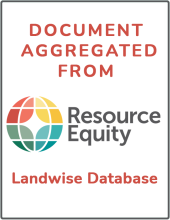Land Library
Bem-vindo à Biblioteca do Land Portal. Explore nossa vasta coleção de recursos de acesso aberto (mais de 74.000), incluindo relatórios, artigos de revistas científicas, trabalhos de pesquisa, publicações revisadas por pares, documentos jurídicos, vídeos e muito mais.
/ library resources
Showing items 1 through 9 of 79.The authors address questions such as: (1) how do parents allocate land and education between sons and daughters? (2) how do changing returns to land and human capital affect parents' investments in children?
"Agricultural research has greatly increased the yields of important staple food crops, and for many people this has meant more food availability and trade opportunities. Yet many people in rural areas in developing countries still live in abject poverty.
Agricultural growth will prove essential for improving the welfare of the vast majority of Africa’s poor. Roughly 80 percent of the continent’s poor live in rural areas, and even those who do not will depend heavily on increasing agricultural productivity to lift them out of poverty.
"A key objective of China's reform program was to reduce distortions in the economic system and enhance growth. However, when implemented in incremental and partial ways, local governments or individuals have chance to capture rents inherent in the reform process.
This brief considers the benefits and costs of alternative tenure and institutional arrangements and the impact of existing legal and policy frameworks on the sustainability and equity of pastoral production systems under three categories of landownership: (1) state ownership; (2) individual owne
This paper analyzes the impact of land titling on child health and education in Argentina.
Governments are now shifting their role from direct management of irrigation systems to regulation of the water sector, provision of support services to water user associations, and capacity building among water user associations and irrigation service providers....
"Advocates of reforms in land rights and land markets frequently posit two important hypotheses: (1) African countries must grant land titles to farmers because titles increase land tenure security and facilitate access to input, land, and financial markets; and (2) land markets constitute the mo


